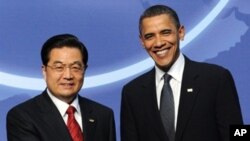Ties between China and the United States appeared to warm this week and move beyond recent tensions as the two countries met on the sidelines of the Nuclear Security Summit in Washington. China agreed to discuss new sanctions on Iran over the country's suspect nuclear program, and President Hu Jintao's attendance at the meeting was being seen as a foreign policy success. Analysts say that while relations appear to be improving, tensions over arms sales to Taiwan, the currency and trade will continue to test ties between the two countries.
During a bilateral meeting Monday, the tensions of recent months between the U.S. and China seemed to fade.
The most contentious issues before this week involved arms sales to Taiwan, trade, President Barack Obama's meeting with Tibet's exiled spiritual leader the Dalai Lama, the censorship of Google in China.
At the height of tensions between the two sides in recent months some political analysts believed that Mr. Hu might not even attend this week's event, as a show of China's anger.
But that did not happen.
Richard Bush, Director of the Center For Northeast Asian Studies at the Brookings Institute says that while the two sides have generally learned how to push such disputes aside, this time was a little different. He says that China got a little more tense than usual and it was uncertain for a time whether Beijing could put its disputes aside. "But in the end, the United States remained firm, and China blinked and we're now back to a more constructive mode," he said.
Bush says that Mr. Hu agreed to come to the United States, but only after Beijing received some reassurances that that the Taiwan arms sale deal and Dalai Lama visit did not represent a change in U.S. policy.
He says that the Obama administration resolved this by just restating its position on U.S. - China relations to Beijing.
The other concern was over China's currency. "The Chinese side did not want their president coming to Washington D.C. for the early part of the week of the [April] 12th and then having us announce that China was a currency manipulator when he (Mr. Hu) was flying down to South America on the 15th, that would've represented a huge loss of face and would've created political problems back in China," he said.
Bush says that the solution to this, apparently has been the U.S. decision to hold off a currency manipulation report that would have been potentially embarrassing to China and Beijing's recent indications that it might allow the valuation of its currency to once again gradually rise.
Some American economists and lawmakers argue that Beijing is deliberately undervaluing its currency, the yuan, giving Chinese exporters an unfair advantage.
Walter Lohman, the director of the Asian Studies Center at the Heritage Foundation does not think much has changed in the relationship.
Lohman says that the problems that came up in the past few months are the result of long-standing American commitments that were there before and will be there after the recent hiccup in relations. "These things underlie the relationship. They are still there. And I think that just Hu Jintao coming to Washington for the nuclear summit does not get us over that bump. I think there are going to be continuing issues in the relationship," he said.
Lohman adds that that the next time the U.S. approves an arms sale deal to Taiwan, the tensions over such a decision are likely to be the same. "This is the relationship, this is the way it is. There are ups and downs. Things we work on together, things we can't work on so closely together. But I think that's been the case for a good long time," he said.
During their meeting Monday, Chinese President Hu Jintao stressed diplomacy and dialogue on the issue of Iran in addition to agreeing to engage in serious discussions with the U.S. and several other Western nations about sanctions.
Speaking about the Chinese yuan in that same meeting, the Chinese president told Mr. Obama that reform on the yuan's exchange rate mechanism should be based on China's own economic and social development needs, not on foreign pressures.
Analysts: US-Beijing Get Over Hiccup in Relations, but Challenges Remain




